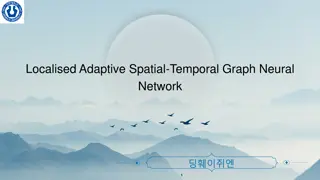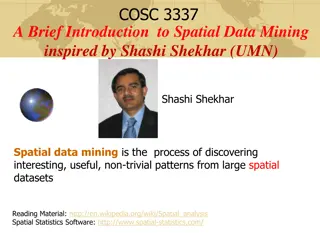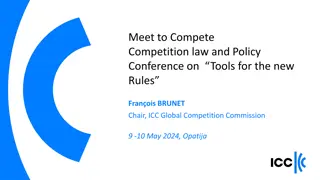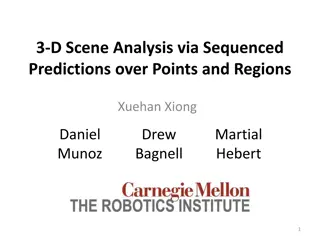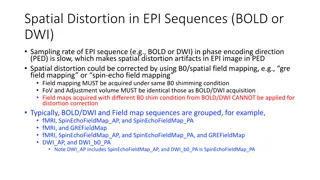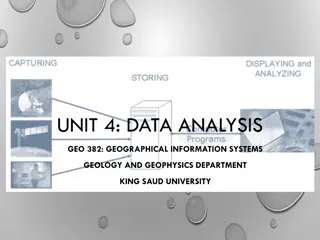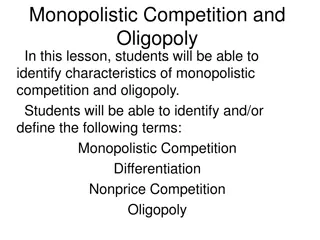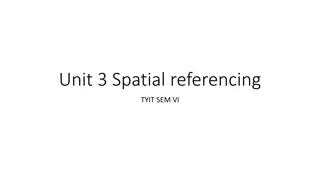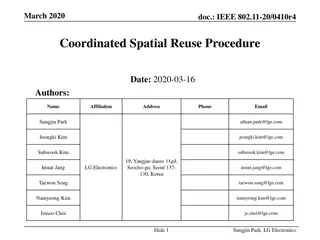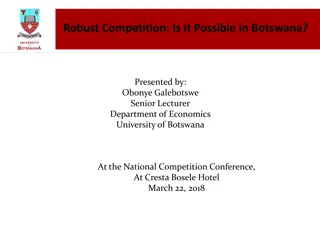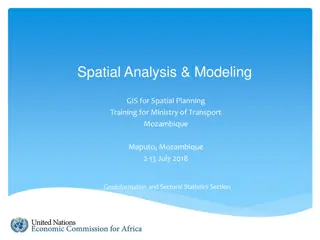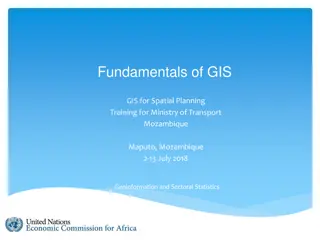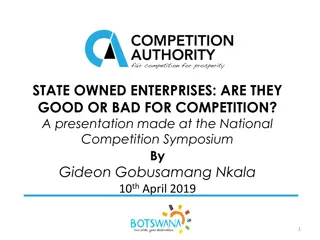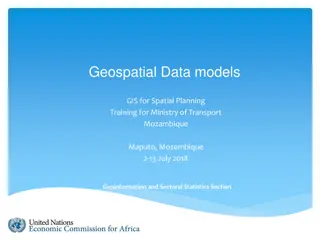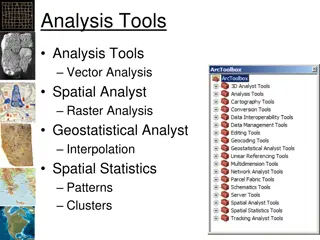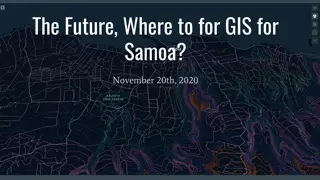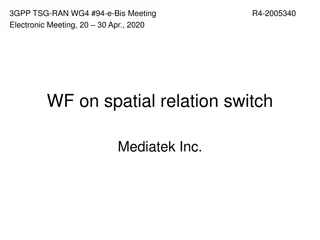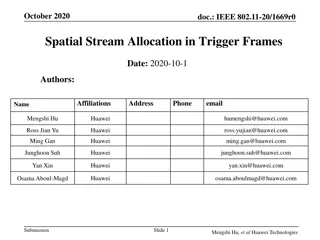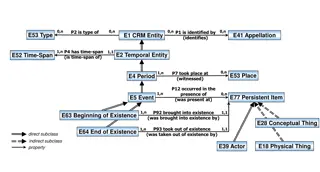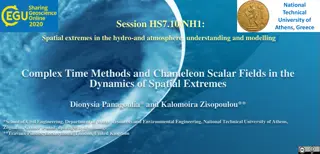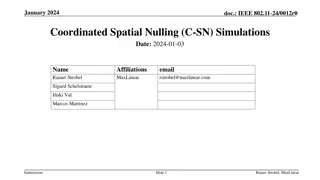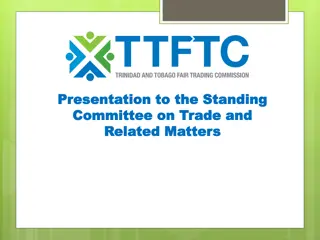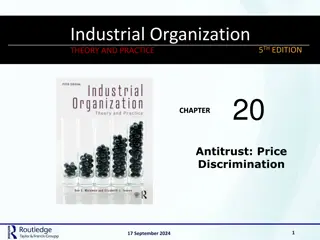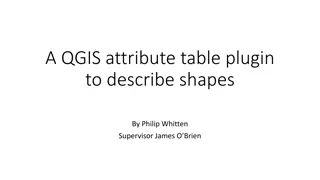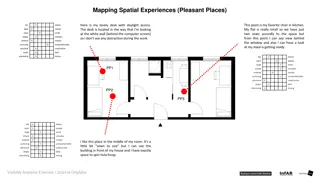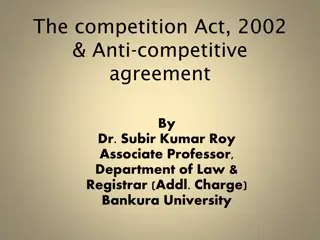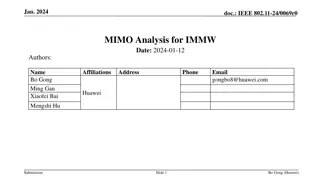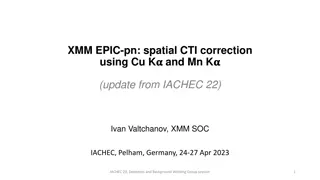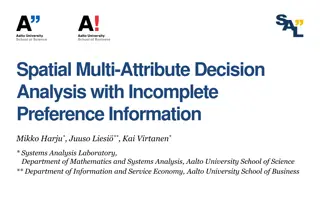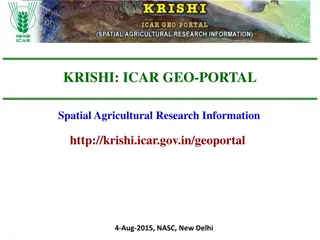WISK: A Workload-aware Learned Index for Spatial Keyword Queries
WISK, a workload-aware learned index that combines spatial and keyword queries to efficiently retrieve objects. It integrates spatial and textual indexes and considers query workload information.
1 views • 17 slides
fMRI Coregistration and Spatial Normalization Methods
fMRI data analysis involves coregistration and spatial normalization to align functional and structural images, reduce variability, and prepare data for statistical analysis. Coregistration aligns images from different modalities within subjects, while spatial normalization achieves precise anatomic
3 views • 35 slides
Coregistration and Spatial Normalization in fMRI Analysis
Coregistration and Spatial Normalization are essential steps in fMRI data preprocessing to ensure accurate alignment of functional and structural images for further analysis. Coregistration involves aligning images from different modalities within the same individual, while spatial normalization aim
6 views • 42 slides
Localised Adaptive Spatial-Temporal Graph Neural Network
This paper introduces the Localised Adaptive Spatial-Temporal Graph Neural Network model, focusing on the importance of spatial-temporal data modeling in graph structures. The challenges of balancing spatial and temporal dependencies for accurate inference are addressed, along with the use of distri
3 views • 19 slides
Introduction to Spatial Data Mining: Discovering Patterns in Large Datasets
Spatial data mining involves uncovering valuable patterns from extensive spatial datasets, offering insights into historical events, environmental phenomena, and predictive analytics. Examples range from analyzing disease outbreaks to predicting habitat suitability for endangered species. The applic
1 views • 20 slides
ICC Global Competition Commission Conference 2024 Overview
The ICC Global Competition Commission is hosting the "Meet to Compete: Competition Law and Policy Conference" in Opatija on 9th-10th May 2024. The event aims to enhance harmonization and convergence among jurisdictions in competition policy areas, increase antitrust enforcement efficiency globally,
2 views • 13 slides
Advanced Techniques in 3D Scene Analysis for Spatial Understanding
Cutting-edge research in 3D scene analysis focuses on sequenced predictions over points and regions for comprehensive spatial understanding. The approach involves contextual classification, overcoming limitations of classical graphical models through innovative inference machines that prioritize tra
0 views • 40 slides
Understanding Spatial Database Systems: An Overview
This presentation by Xiaozhi Yu introduces the fundamentals of spatial database systems, covering topics such as spatial data types, relationships, system architecture, modeling, and organizing underlying spaces. It delves into the importance of integrating geometry into DBMS data models, spatial in
1 views • 30 slides
Spatial Distortion Correction in EPI Sequences: Field Mapping Examples
Spatial distortion artifacts in EPI sequences (BOLD or DWI) due to slow sampling rates in the phase encoding direction can be corrected using B0/spatial field mapping techniques. This correction requires obtaining field maps under the same B0 shimming conditions and with identical FoV and adjustment
0 views • 4 slides
Understanding Market Structures and Competition
Exploring market structures such as perfect competition and monopolies, this content delves into the characteristics, implications, and types of different market environments. Perfect competition involves many buyers and sellers offering identical products, whereas monopolies arise from barriers pre
0 views • 31 slides
Understanding Spatial Analysis in GIS for Effective Decision-Making
Spatial analysis in GIS involves modeling geographic problems, processing data, and exploring results to understand spatial relationships, patterns, and suitability for various purposes. GIS tools offer unique capabilities for handling geographically referenced data, data entry, storage, manipulatio
2 views • 21 slides
Understanding Monopolistic Competition and Oligopoly
Learn about the characteristics of monopolistic competition and oligopoly in the marketplace. Discover terms like Monopolistic Competition, Differentiation, Nonprice Competition, and Oligopoly. Understand how monopolistic competition involves similar but not identical products, while oligopoly is do
1 views • 15 slides
Understanding Spatial Referencing Systems for Mapping
Spatial reference systems play a crucial role in defining geographic parameters and coordinate systems for mapping. They consist of components like orientation, latitude, longitude, and elevation, which help in representing spatial properties on maps. Reference surfaces such as the Geoid and ellipso
3 views • 13 slides
Understanding IEEE 802.11-20/0410r4 Coordinated Spatial Reuse Procedure
This document presents the Coordinated Spatial Reuse (CSR) procedure in IEEE 802.11-20/0410r4, focusing on the transmission schemes and necessary information for effective spatial reuse. It outlines the topology of CSR environments, acquisition of information for CSR, CSR capability announcement by
8 views • 23 slides
Benefits of Robust Competition in Botswana: Insights and Recommendations
Explore the advantages of competition in Botswana as discussed at the National Competition Conference. Learn about the impact on prices, quality, choice, efficiency, innovation, economic growth, and more. Discover how fostering competition can benefit consumers, businesses, and the economy on a glob
0 views • 17 slides
Spatial Analysis & Modeling for Spatial Planning Training in Maputo, Mozambique
Explore spatial analysis techniques for efficient route planning, site selection, pattern identification, and value prediction in the context of spatial planning. Learn about surface modeling, relationships among features, and the importance of spatial modeling in addressing geographical problems.
0 views • 27 slides
Understanding the Components of GIS for Spatial Planning
A geographic information system (GIS) is a powerful tool for capturing, storing, analyzing, and presenting spatial data. This training program explores the fundamentals of GIS, including software and hardware components, data considerations, and the importance of people and policies in utilizing GIS
5 views • 16 slides
State-Owned Enterprises and Competition: Impact and Implications
State-Owned Enterprises (SOEs) play a significant role in economies worldwide. This presentation by Gideon Gobusamang Nkala at the National Competition Symposium delves into the debate on whether SOEs are beneficial or detrimental to competition. Exploring the features, rationale, and competition po
5 views • 18 slides
GIS Data Models for Spatial Planning Training in Maputo, Mozambique
Explore the concepts of GIS data models including vector vs. raster, spatial relationships, spatial operations, and representation of real-world entities in a spatial database. Understand how spatial data models are used to manipulate spatially-referenced information and define the spatial location
1 views • 32 slides
Understanding Spatial Autocorrelation in Geostatistical Analysis
Explore the concept of spatial autocorrelation, its implications in geostatistical analysis, and the importance of detecting and interpreting it correctly. Learn about auto-correlation, signal components, correlation significance, and measuring autocorrelation using tools like Moran's I. Gain insigh
0 views • 12 slides
Future Directions for GIS in Samoa
Enhancing GIS practices in Samoa involves establishing a Samoa GIS User Group, improving spatial data management, developing a national spatial data infrastructure framework, and implementing GIS applications in various sectors like emergency response, public access, and natural resource management.
3 views • 12 slides
Spatial Relation Switching Requirements in 3GPP NR RAN Plenary Meeting
The document discusses various spatial relation switching requirements for uplink scenarios in the 3GPP NR RAN Plenary Meeting. It covers agreement points related to UL SRS, PUCCH, P-SRS, and DL-RS, defining delay requirements and known conditions for spatial relation switching. The agreements provi
0 views • 11 slides
Spatial Stream Allocation in IEEE 802.11-20 Trigger Frames
The document discusses spatial stream allocation in IEEE 802.11-20 trigger frames, specifically focusing on the SS Allocation subfield. It explains how trigger frames allocate resources for TB PPDU transmissions and solicit User Info fields, detailing the RU Allocation and SS Allocation subfields. T
3 views • 15 slides
Understanding Temporal and Spatial Information Models
This content delves into the intricacies of temporal and spatial information models, covering concepts such as existence, presence, and spatiotemporal relationships. It explores how entities are identified, events are witnessed, and durations are defined within these models. The interplay between ti
3 views • 9 slides
Understanding Spatial Extremes: Complex Time Methods in Hydro-Atmospheric Dynamics
This study explores the use of complex time methods and chameleon scalar fields in understanding and modeling spatial extremes in hydrological and atmospheric systems. By transforming Lagrangian processes and introducing chameleon scalar fields, the research unveils new insights into the mechanism g
0 views • 9 slides
Coordinated Spatial Nulling (C-SN) Simulations in IEEE 802.11-24/0012r0
The document discusses the concept of Coordinated Spatial Nulling (C-SN) in IEEE 802.11-24/0012r0, focusing on spatial nulling feedback, synchronization needs, advantages of partial nulling, and comparison of half-coordinated versus fully coordinated scenarios. Simulation results are presented, anal
0 views • 19 slides
Competition and Fair Trading in Trinidad and Tobago
This presentation covers the importance of competition, the history of competition policy in Trinidad and Tobago, the establishment of the Fair Trading Act and Commission, and the key aspects of the Act including the prohibition of anti-competitive practices. Learn about the benefits of competition,
0 views • 18 slides
Antitrust and Price Discrimination: Robinson-Patman Act Overview
The Robinson-Patman Act, a significant antitrust statute, aims to prevent price discrimination that harms competition, particularly targeting sellers granting discriminatory prices. While some price discrimination can enhance efficiency, predatory discrimination poses a serious threat to competition
0 views • 30 slides
Understanding Spatial Racism and Its Role in the Flint Water Crisis
Professor Peter J. Hammer's testimony before the Michigan Civil Rights Commission sheds light on the historical lineage of spatial racism in Flint and Genesee County. The interaction between beliefs and institutions over time has shaped racial oppression, from slavery to current issues such as the F
0 views • 38 slides
Enhancing Spatial Data Analysis in QGIS
Explore the integration of relational databases with QGIS to facilitate efficient spatial data analysis. Discover the importance of recognizing spatial relationships within data sets and the solutions to enhance QGIS for relational datasets. Overcome challenges and delve into the intersection and su
0 views • 25 slides
Spatial Experiences in a Small Flat
Mapping spatial experiences in a small flat, this content describes pleasant and unpleasant places within the living space. It highlights favorite spots like a kitchen chair with a view, a cozy desk for work, and a room with enough space for activities. In contrast, it mentions bothersome areas like
0 views • 10 slides
Combatting Bid-Rigging in Public Procurement: Insights from Botswana's Competition Policy
Botswana's approach to combating bid-rigging in public procurement involves a comprehensive competition policy and law framework. The National Competition Policy, adopted in 2005, aims to prevent anticompetitive practices and create a business-friendly environment. The Competition Act of 2009 specif
0 views • 15 slides
Marine Spatial Data Infrastructures Report Overview
The report provides insights into the activities and discussions at the EAHC-MSDIWG1 meeting held in Busan, ROK. It outlines the key agenda items, country reports on national MSDI, membership details, importance of MSDI, and trends in marine spatial data. The report emphasizes the significance of ma
0 views • 11 slides
Promoting Better Lives Through OECD's Competition Policies
The OECD's Competition Division works towards promoting fairer development, better education, healthcare, pensions, and employment through its outreach programs and global forums. The Global Forum on Competition engages participants from around the world to discuss topics like fighting corruption, p
0 views • 15 slides
The Competition Act, 2002 & Anti-Competitive Agreements: Overview
The Competition Act, 2002 primarily focuses on prohibiting anti-competitive agreements, preventing abuse of dominant positions, regulating combinations, and establishing the Competition Commission of India. Section 3 of the Act specifically prohibits agreements that have an adverse impact on competi
0 views • 15 slides
Analysis of MIMO for IMMW Transmission in IEEE 802.11-24
Proposal discusses the suitability of MIMO for IMMW transmission under different scenarios. The analysis focuses on the number of spatial streams based on channel rank and quality, recommending dual-polarization for LOS paths supporting 2 spatial streams and spatial separation for larger devices sup
0 views • 16 slides
XMM EPIC-pn Spatial CTI Correction using Cu K? and Mn K?
Detailed procedures for spatial CTI correction using Cu K? and Mn K? in XMM EPIC-pn detectors, including applying long-term CTI corrections, stacking event lists, extracting spectra, fitting Cu K line, and deriving spatial offsets. Examples show improvements in velocity space after corrections. Vali
0 views • 18 slides
Spatial Multi-Attribute Decision Analysis with Incomplete Preference Information
In this study by Mikko Harju, Juuso Liesi, and Kai Virtanen from Aalto University, the focus is on spatial decision analysis for scenarios where decision alternatives have varying consequences across a geographical region. The research delves into the significance of spatial value functions in repre
0 views • 19 slides
Understanding Pricing and Competition in Land Surveying from a Competition Perspective
Delve into the importance of pricing and competition among land surveyors from a competition analyst's viewpoint. Explore the significance of fairness, consumer choice, and competition promotion in the context of pricing strategies. Gain insights into the relationship between pricing and competition
0 views • 15 slides
ICAR KRISHI Geo-Portal: Spatial Agricultural Research Information
ICAR KRISHI Geo-Portal is a digital platform aiming to facilitate spatial agricultural data generation, compilation, visualization, and analysis. It hosts spatial databases, provides map services, and allows data sharing across platforms. The portal, developed using open-source technologies, offers
1 views • 32 slides



